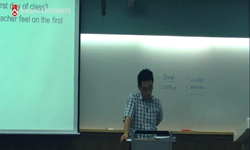배경 및 목적: 알츠하이머병 가장 초기의 언어기능 손상의 특징을 알아보기 위해 알츠하이머병전단계로 알려져 있는 건망형 경도인지장애(mild cognitive impairment: MCI, 이하 MCI) 환자와 경도 알...
http://chineseinput.net/에서 pinyin(병음)방식으로 중국어를 변환할 수 있습니다.
변환된 중국어를 복사하여 사용하시면 됩니다.
- 中文 을 입력하시려면 zhongwen을 입력하시고 space를누르시면됩니다.
- 北京 을 입력하시려면 beijing을 입력하시고 space를 누르시면 됩니다.


Performances in a Picture Description Task in Japanese Patients with Alzheimer’s Disease and with Mild Cognitive Impairment
한글로보기https://www.riss.kr/link?id=A82382612
- 저자
- 발행기관
- 학술지명
- 권호사항
-
발행연도
2009
-
작성언어
-
- 주제어
-
KDC
370
-
등재정보
KCI등재,SCOPUS,ESCI
-
자료형태
학술저널
- 발행기관 URL
-
수록면
326-337(12쪽)
-
KCI 피인용횟수
7
- 제공처
-
0
상세조회 -
0
다운로드
부가정보
국문 초록 (Abstract)
배경 및 목적: 알츠하이머병 가장 초기의 언어기능 손상의 특징을 알아보기 위해 알츠하이머병전단계로 알려져 있는 건망형 경도인지장애(mild cognitive impairment: MCI, 이하 MCI) 환자와 경도 알츠하이머병(Alzheimer’s disease: AD, 이하 AD) 환자들에게 언어 검사를 실시하여이를 정상 고령자와 비교하였다. 방법: 본 연구에서는 일본인을 대상으로 하였으며, MCI 환자20명, 경도 AD 환자 27명, 정상고령자 20명이 참여하였다. 참여자들에게 대면이름대기 과제(Test of Lexical Processing in Aphasia (TLPA-Japanese))와 Communicative Abilities inDaily Living (CADL-Japanese), 그림설명하기 과제(The Boston Cookie-Theft picture)를 실시하였다. 그림설명하기 과제의 수행은 구문적/의미적으로 분석하였다. 결과: 1) 대면이름과제와 CADL에서 경도 AD 환자들은 MCI 환자나 정상 고령자에 비해 유의미하게 수행이 낮은반면, MCI 환자들은 정상 고령자와 유의한 차이가 없었다. 2) 그림설명하기 과제의 수행 결과의미적인 측면에서 경도 AD와 MCI 환자는 정상 고령자에 비해 정보량이 부족하고, 비효율적이며, 공허한(empty) 내용의 언어를 사용하는 것으로 나타났다. 그러나 구문적인 측면에서는경도 AD 환자를 포함한 3집단에 유의한 차이가 나타나지 않았다. 논의 및 결론: 본 연구에서MCI 환자의 미세한 언어 기능의 손상을 검출 할 수 있는 과제는 그림설명하기 과제(의미적측면)뿐이었다. 그림설명하기 과제는 실시와 분석이 간단함에도 불구하고 다양한 의사소통기능을 통합적으로 평가할 수 있는 유용한 과제임을 알 수 있다.
다국어 초록 (Multilingual Abstract)
Background & Objectives: To determine the earliest changes in language function in participants with Alzheimer’s disease, performances in various language tests were compared between patients with amnestic mild cognitive impairment (MCI) or with mil...
Background & Objectives: To determine the earliest changes in language function in participants with Alzheimer’s disease, performances in various language tests were compared between patients with amnestic mild cognitive impairment (MCI) or with mild Alzheimer’s disease (AD) and healthy elderly individuals. Methods: Language function was studied in patients with amnestic MCI (n = 20) and with mild AD (n = 27) and was compared with
normal cognition in elderly individuals (NC, n = 20) using the Communicative Abilities in Daily Living (CADL), a confrontation naming test, and the Boston Cookie-Theft picture description task. The analysis for the picture description task was divided into two aspects: syntactic and semantic. Results: 1) In the CADL and confrontation naming tests, the mild AD group performed worse than did the NC and MCI groups. However, there was no significant difference between the NC and MCI groups. 2) In the Cookie-Theft picture description task,
performances of the MCI and AD groups were non-informative, inefficient and empty in semantic aspect compared to the NC group. However, no differences were observed between the three groups on syntactic aspect. Discussion & Conclusion: The picture description task is useful for detecting subtle language deficits in patients with amnestic MCI. This study demonstrated that the picture description task can sensitively detect complex integrated communication abilities, although it is very quick and simple to administer.
목차 (Table of Contents)
- Ⅰ. Introduction
- Ⅱ. Methods
- Ⅲ. Results
- Ⅳ. Discussion and Conclusion
- Ⅰ. Introduction
- Ⅱ. Methods
- Ⅲ. Results
- Ⅳ. Discussion and Conclusion
참고문헌 (Reference)
1 Henry, J. D, "Verbal fluency performance in dementia of the Alzheimer’s type: A meta-analysis" 42 : 1212-1222, 2004
2 Horner, J, "The relationship of agraphia to the severity of dementia in Alzheimer’s disease" 45 : 760-763, 1988
3 Shuttleworth, E. C, "The naming disorder of dementia of Alzheimer’s type" 34 : 222-234, 1988
4 Kirschner, H. S, "The naming disorder of dementia" 22 : 23-30, 1984
5 Garrard, P, "The effects of very early Alzheimer’s disease on the characteristics of writing by a renowned auther" 128 : 250-260, 2005
6 Goodglass, H, "The assessment aphasia and related disorders (2nd ed.)" Lea and Febiger 1983
7 Morris,J.C, "The Clinical Dementia Rating (CDR): Current version and scoring rules" 43 : 2412-2414, 1993
8 Bschor, T, "Spontaneous speech of patients with dementia of Alzheimer type and mild cognitive impairments" 13 : 289-298, 2001
9 Ardila, A, "Spontaneous language production and aging: Sex and educational effects" 87 : 71-78, 1996
10 Chertkow, H, "Semantic memory loss in dementia of Alzheimer’s type" 113 : 397-417, 1990
1 Henry, J. D, "Verbal fluency performance in dementia of the Alzheimer’s type: A meta-analysis" 42 : 1212-1222, 2004
2 Horner, J, "The relationship of agraphia to the severity of dementia in Alzheimer’s disease" 45 : 760-763, 1988
3 Shuttleworth, E. C, "The naming disorder of dementia of Alzheimer’s type" 34 : 222-234, 1988
4 Kirschner, H. S, "The naming disorder of dementia" 22 : 23-30, 1984
5 Garrard, P, "The effects of very early Alzheimer’s disease on the characteristics of writing by a renowned auther" 128 : 250-260, 2005
6 Goodglass, H, "The assessment aphasia and related disorders (2nd ed.)" Lea and Febiger 1983
7 Morris,J.C, "The Clinical Dementia Rating (CDR): Current version and scoring rules" 43 : 2412-2414, 1993
8 Bschor, T, "Spontaneous speech of patients with dementia of Alzheimer type and mild cognitive impairments" 13 : 289-298, 2001
9 Ardila, A, "Spontaneous language production and aging: Sex and educational effects" 87 : 71-78, 1996
10 Chertkow, H, "Semantic memory loss in dementia of Alzheimer’s type" 113 : 397-417, 1990
11 Adlam, A. R, "Semantic knowledge in mild cognitive impairment and mild Alzheimer’s disease" 42 : 675-684, 2006
12 Carlomagno, S., "Referential communication in Alzheimer’s type dementia" 41 : 520-534, 2005
13 Feyereisen, P, "Pragmatic skills in the early stages of Alzheimer’s disease: An analysis by means of a referential communication task" 42 : 1-17, 2007
14 Fillenbaum, G. G, "Performance on the CERAD neuropsychology battery of two samples of Japanese-American elders: Norms for persons with and without dementia" 11 : 192-201, 2005
15 Giles, E, "Performance on the Boston Cookie Theft picture description task in patients with early dementia of the Alzheimer’s type: Missing information" 10 : 395-408, 1996
16 Glosser, G, "Patterns of discourse production among neurological patients with fluent language disorders" 40 : 67-88, 1991
17 Ribeiro, F, "Mild cognitive impairment: Deficits in cognitive domains other than memory" 21 : 284-290, 2006
18 Petersen, R. C, "Mild cognitive impairment: Clinical characterization and outcome" 56 : 303-308, 1999
19 Petersen,R.C, "Mild cognitive impairment as a diagnostic entity" 256 : 183-194, 2004
20 Portet, F, "Mild cognitive impairment (MCI) in medical practice: A critical review of the concept and new diagnostic procedure. Report of the MCI Working Group of the European Consortium on Alzheimer’s Disease" 77 : 714-718, 2006
21 Sugishita,M, "Manual for the Japanese version of WMS-R" Nihon Bunka Kagakusha 2001
22 Farias, S. T, "MCI is associated with deficits in everyday functioning" 20 : 217-223, 2006
23 Cuetos, F, "Linguistic changes in verbal expression: A preclinical marker of Alzheimer’s disease" 13 : 1-7, 2007
24 Hier, D. B, "Language disintegration in dementia: Effects of etiology and severity" 25 : 117-133, 1985
25 Brookshire,R.H, "Introduction to neurogenic communication disorders (6th ed.)" Mosby 2003
26 Alexander,M.P, "Impairments of procedures for implementing complex language are due to disruption of frontal attention processes" 12 : 236-247, 2006
27 Sakuma, N, "Impairment of narratives abilities in patients with dementia: A study based on the picture description task" 5 : 134-145, 1989
28 Shimada, M, "Impaired verbal description ability assessed by the picture description task in Alzheimer’s disease" 27 : 57-65, 1998
29 Fromm, D, "Functional communication in Alzheimer’s disease" 54 : 535-540, 1989
30 Chapman, S. B, "Discourse changes in early Alzheimer disease, mild cognitive impairment, and normal aging" 16 : 177-186, 2002
31 Duong, A, "Discourse about discourse: What is it and how dose it progress in Alzheimer’s disease" 53 : 177-180, 2003
32 Forbes-McKay, K. E, "Detecting subtle spontaneous language decline in early Alzheimer’s disease with a picture description task" 26 : 243-254, 2005
33 Petersen, R. C, "Current concepts in mild cognitive impairment" 58 : 1985-1992, 2001
34 Tomoeda, C. K, "Cross-sectional analysis of Alzheimer disease effects on oral discourse in a picture description task" 10 : 204-215, 1996
35 Bayles, K. A, "Confrontation naming impairment in dementia" 19 : 98-114, 1983
36 Testa, J. A, "Confrontation naming dose not add incremental diagnostic utility in MCI and Alzheimer’s disease" 10 : 504-512, 2004
37 Croisile, B, "Comparative study of oral and written picture description in patients with Alzheimer’s disease" 53 : 1-19, 1996
38 Watamori, T, "Communicative Abilities in Daily Living-Japanese version" Ishiyaku 1990
39 Holland,A.L, "Communication Abilities in Daily Living" Pro-Ed 1980
40 Vuorinen, E, "Common pattern of language impairment in vascular dementia and in Alzheimer’s disease" 14 : 81-86, 2000
41 McKhann, G, "Clinical diagnosis of Alzheimer’s disease: Report of the NINCDS – ADRDA Work Group under the auspices of Department of Health and Human Services Task Force on Alzheimer’s Disease" 34 : 934-944, 1984
42 Groves-Wright, K, "Burnett, R., & O’Neill, M. J. (2004). A comparison of verbal and written language in Alzheimer’s disease" 37 : 109-130, 2004
43 Horwitz, B, "Brain network interaction in auditory, visual and linguistic processing" 89 : 377-384, 2004
44 Fujita, I, "A Test of Lexical Processing in Aphasia (TLPA)-Japanese" Escor 2000
동일학술지(권/호) 다른 논문
-
구개파열 아동과 일반 아동의 자음정확도, 언어능력, 읽기능력 및 비음치와 말명료도 간의 관련성
- 한국언어청각임상학회
- 강정은(Jungeun Kang)
- 2009
- KCI등재,SCOPUS,ESCI
-
- 한국언어청각임상학회
- 임종아(Jongah Lim)
- 2009
- KCI등재,SCOPUS,ESCI
-
- 한국언어청각임상학회
- 정미란(Miran Jeong)
- 2009
- KCI등재,SCOPUS,ESCI
-
- 한국언어청각임상학회
- 최은아(Eunah Choi)
- 2009
- KCI등재,SCOPUS,ESCI
분석정보
인용정보 인용지수 설명보기
학술지 이력
| 연월일 | 이력구분 | 이력상세 | 등재구분 |
|---|---|---|---|
| 2018 | 평가예정 | 계속평가 신청대상(등재유지) | |
| 2015-01-01 | 평가 | 등재학술지 유지(등재유지) |  |
| 2013-03-29 | 학술지명변경 | 한글명 : Communication Sciences and Disorders</br>외국어명 : Communication Sciences and Disorders |  |
| 2012-12-18 | 학술지명변경 | 한글명 : 언어청각장애연구</br>외국어명 : Communication Sciences and Disorders |  |
| 2011-01-01 | 평가 | 등재학술지 유지(등재유지) |  |
| 2009-01-01 | 평가 | 등재학술지 유지(등재유지) |  |
| 2007-06-25 | 학술지명변경 | 한글명 : 언어청각장애연구</br>외국어명 : Korean Journal of Communication Disorders |  |
| 2007-01-01 | 평가 | 등재학술지 유지(등재유지) |  |
| 2006-09-13 | 학술지명변경 | 한글명 : 언어청각장애연구</br>외국어명 : Korean Journal of Communication Disorders |  |
| 2005-10-14 | 학술지명변경 | 한글명 : 언어청각장애연구</br>외국어명 : Korean Journal of Communication Disorders |  |
| 2004-01-01 | 평가 | 등재학술지 선정(등재후보2차) |  |
| 2003-01-01 | 평가 | 등재후보 1차 PASS(등재후보1차) |  |
| 2001-07-01 | 평가 | 등재후보학술지 선정(신규평가) |  |
학술지 인용정보
| 기준연도 | WOS-KCI 통합IF(2년) | KCIF(2년) | KCIF(3년) |
|---|---|---|---|
| 2016 | 1.13 | 1.13 | 1.17 |
| KCIF(4년) | KCIF(5년) | 중심성지수(3년) | 즉시성지수 |
| 1.21 | 1.18 | 1.626 | 0.33 |




 스콜라
스콜라






